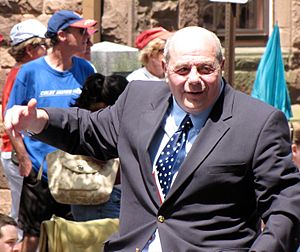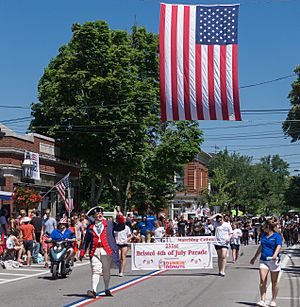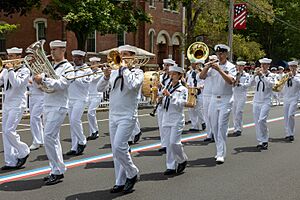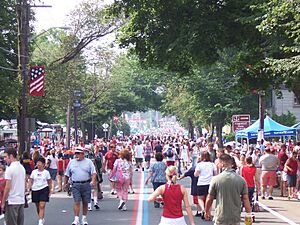Bristol Fourth of July Parade facts for kids
Quick facts for kids The Military, Civic and Fireman’s Fourth of July Parade |
|
|---|---|
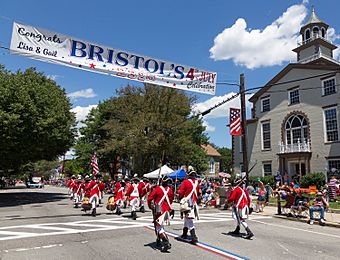
The 232nd parade in 2017
|
|
| Genre | Parade |
| Date(s) | Independence Day |
| Frequency | Annual |
| Location(s) | Bristol, Rhode Island, United States |
| Years active | 238 |
| Inaugurated | 1785 |
| Most recent | July 4, 2023 |
| Next event | July 4, 2024 |
| Attendance | up to 100,000 |
| Patron(s) | Bristol Fourth of July General Committee |
| Website | Bristol 4th of July |
The Bristol Fourth of July Parade is also known as the Bristol Fourth of July Celebration. Its official name is the Military, Civic and Firemen's Parade. This famous parade started in 1785 in Bristol, Rhode Island. It is part of the oldest Independence Day celebration in the United States.
Contents
History of the Bristol Parade
The annual celebrations began in 1785. They were started by Rev. Henry Wight, a veteran of the American Revolutionary War. He first organized "Patriotic Exercises," which later grew into the parade. Today, the Bristol Fourth of July Committee organizes these events.
The festivities officially kick off on June 14, which is Flag Day. This starts a period of fun outdoor concerts and exciting soap-box races. There is also a firefighters' muster at Independence Park. The celebration ends on July 4 with the main parade. This parade is the oldest yearly parade in the United States. It attracts over 200,000 people from Rhode Island and around the world. These big celebrations have given Bristol its nickname: "America's most patriotic town." The Fourth of July has been celebrated every year in Bristol since 1785. Sometimes the parade itself has been canceled. If July 4 falls on a Sunday, the parade happens on Monday the 5th instead.
Buddy Cianci and the Parade
Buddy Cianci was Providence's mayor for a long time. He had a long and interesting history with the Bristol parade. In the 1970s, parade rules said only elected officials from the federal, state, and Bristol town governments could march. Mayors from Providence were not invited.
Even so, Mayor Buddy Cianci marched in the parade every year after he was elected in 1975. This was against the rules. After the 1979 parade, organizers sent him a letter telling him off. The Bristol Town Council even voted to ban Cianci from the 1980 parade. That year, Cianci was running for governor against J. Joseph Garrahy, who, as the current governor, was allowed to march. The Bristol police chief said he would arrest anyone who caused trouble. A record 300,000 people came to the 1980 parade. They waited to see what would happen. When Cianci's helicopter landed, officials decided not to stop him. The crowd cheered loudly for Cianci, more than for anyone else that day.
In 1984, Cianci did not attend the parade. A clown dressed in a prison uniform made fun of him. In 1991, Cianci caused a stir by marching in front of the parade marshal. The parade chairman said Cianci was "rude" and should not be invited back. In 1997 and 1998, Cianci marched with many police officers. They had police boats and bicycle patrols. Officers even squirted water at spectators. This was too much for the parade committee. They voted to uninvite Cianci from the 1999 parade. Cianci skipped 1999, but came back in 2000 to cheers. His last time as mayor in the parade was in 2002. He walked instead of riding a horse. Fans often stopped him to take photos and shake his hand.
In 2003, the new Providence Mayor, David Cicilline, marched in the parade. He had a smaller group with him than the previous mayor.
The 2009 Parade
The Rhode Island Tea-Party Association wanted to enter the parade. They planned a float with a model of the British ship Beaver. This ship was part of the Boston Tea Party in 1773. Helen Glover, a radio person, was on the float.
The Bristol Fourth of July Committee removed the Rhode Island Tea-Party Association float from the 2009 parade. They also banned them from all future parades. This was because they handed out small copies of the Declaration of Independence, the U.S. Constitution, and the Bill of Rights. Handouts are not allowed at the parade. This rule keeps people, especially children, safe from running into floats.
The 2014 Parade
The number of people at the 2014 parade was "much lighter than usual." This was because of bad weather from Tropical Storm Arthur. The parade ended suddenly at 1 p.m. when a thunderstorm hit. Marchers included Rhode Island's members of Congress. Senators Jack Reed and Sheldon Whitehouse were there. Representatives Jim Langevin and David Cicilline also marched. Former Providence mayor Buddy Cianci and candidate Gina Raimondo also attended.
The 2015 Parade
About 50,000 people came to the parade in 2015. Michael Rielly became Bristol's official Town Crier. He took over after Gerry MacNeill retired from the job after 23 years.
The 2020 and 2021 Parades
The 2020 parade was smaller due to the 2020 coronavirus pandemic. Marchers wore masks. Most rode in cars instead of walking. Only small groups of people watched, not the usual thousands. Concerts and the "Longest Traveled Award" were not held. Organizers wanted to keep the celebration local. The parade returned with "full events" on Monday, July 5, 2021. This was because July 4 was a Sunday. There were fewer marching bands that year. The parade was back to "full strength" in 2022. This was after two years of being smaller because of the pandemic.
Celebration Traditions
The Bristol Fourth of July Celebration has many special traditions:
- Patriotic Exercises Speaker: This is the oldest tradition, started in 1785. A notable person is chosen to give a speech.
- Chief Marshal: This is a high honor given to a Bristol resident. It started in 1826.
- Hattie Brown Award: This award is given each year to a Bristol resident. They must show the same spirit of community service as the late Hattie Brown. This award began in 1987.
- Visiting Ship: A U.S. Navy ship visits for the celebration. This tradition started in 1876.
- Drum and Bugle Corps: Groups from all over the country come to perform.
- Fourth of July Ball: This is a fancy event with drinks, a grand march, dinner, and dancing.
- Button Contest: Children in Bristol compete to design the official parade button. The winner gets a $100 bond and can march in the parade.
- Longest Traveled Award: This award goes to the person who traveled the farthest distance to come back to Bristol.
- Pageants for Miss Fourth of July and Little Miss Fourth of July: These are beauty contests. By official parade rules, only the winners of these pageants can be in the parade. Other pageant winners, like Miss Rhode Island, are not allowed. This rule helps keep the parade from becoming too commercial.
See also
 | James Van Der Zee |
 | Alma Thomas |
 | Ellis Wilson |
 | Margaret Taylor-Burroughs |


